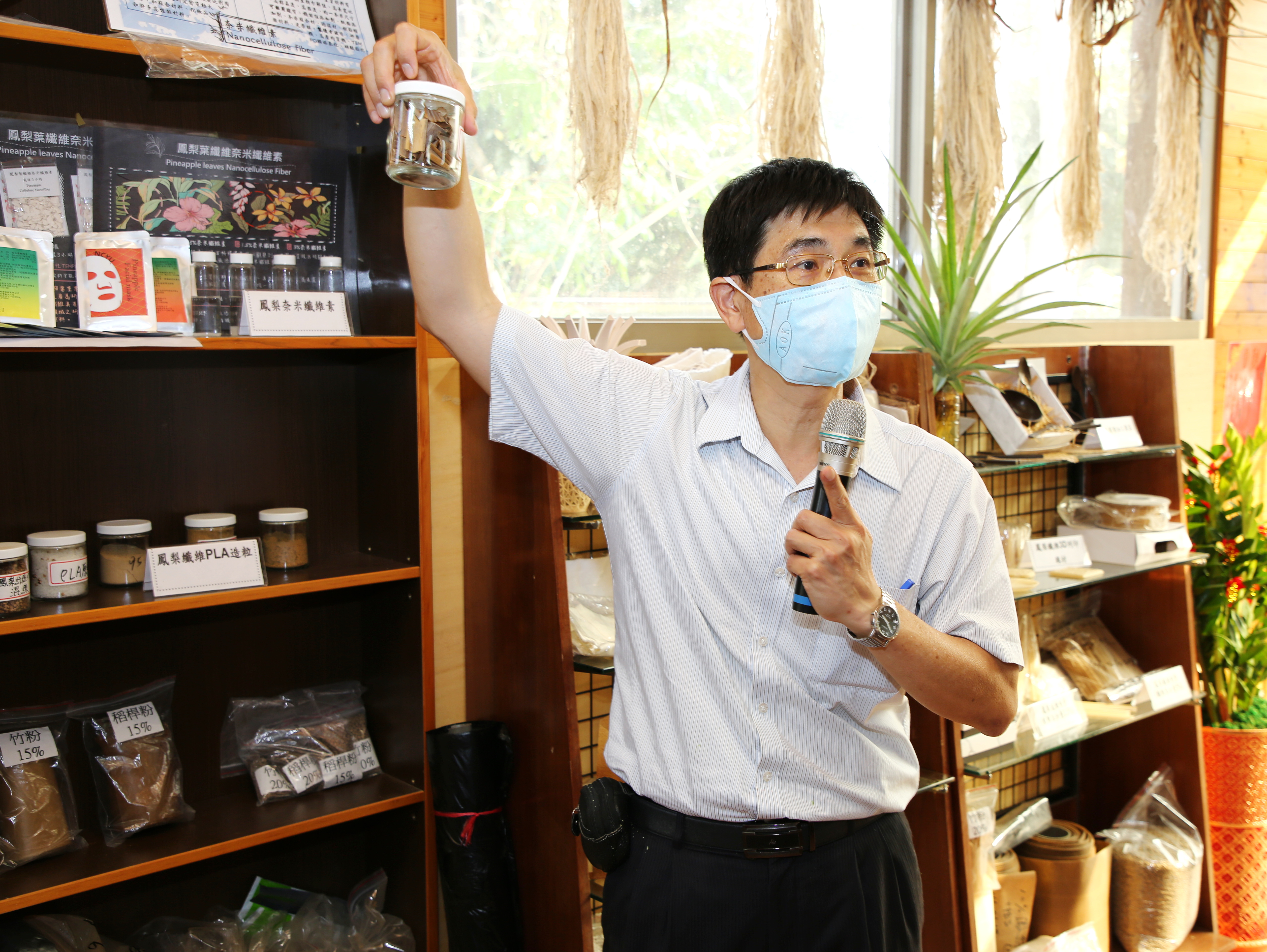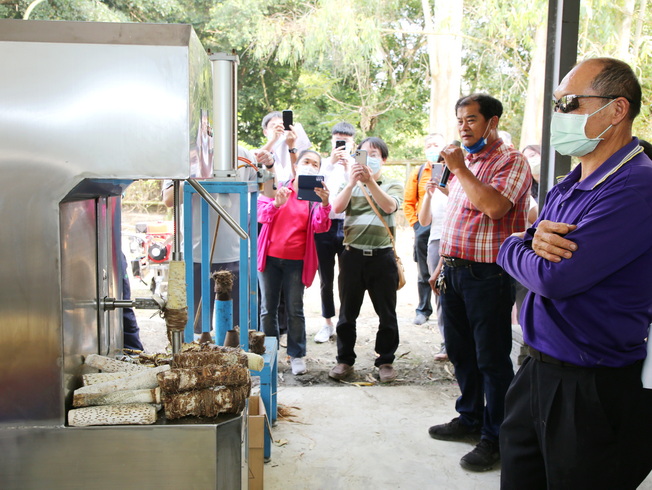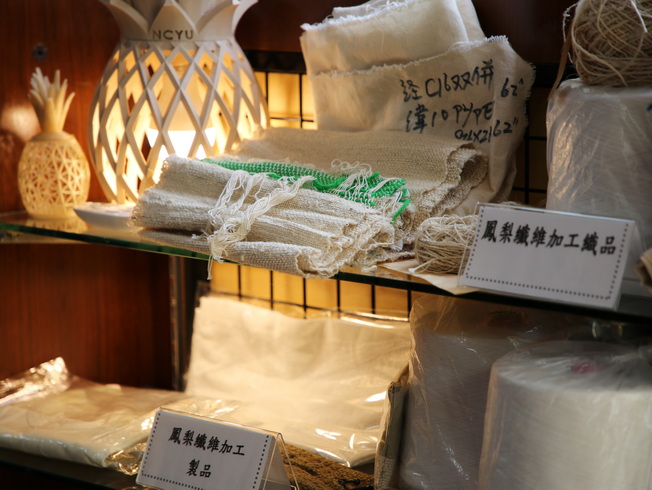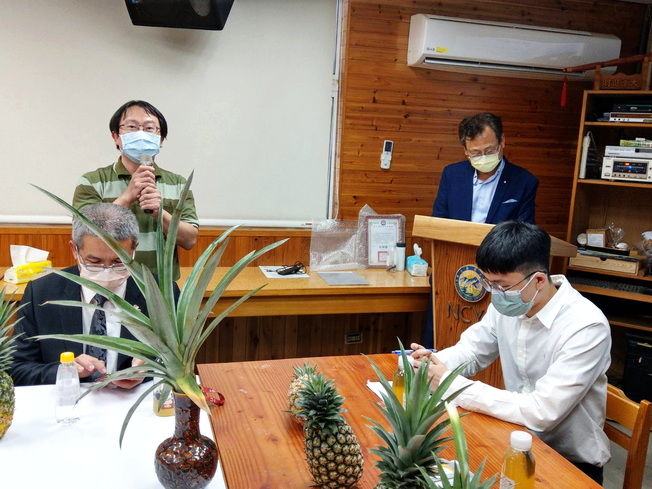| |
 |
News |
 |
Browsing: 1370 times

|
Date:2022-03-21
Bracket:2022 NCYU NEWS
Department:ncyu
|
 Turning Pineapple Stem and Leave Waste into Ecofriendly and Eye-Catching Products
Turning Pineapple Stem and Leave Waste into Ecofriendly and Eye-Catching Products
The teacher team from National Chiayi University has been implementing the project on research, development and application of the intelligent pineapple production field operation machinery sponsored by the Ministry of Science and Technology. On March 21st, “Joint Demonstration of Pineapple Stem Extractor, Fiber Extractor and Pineapple Leaf Fiber High-value Technology” was organized on the Lantan campus. Representatives from the Agriculture and Food Agency, Agricultural Research institute, Tainan District Agricultural Improvement Station, and farmers’ associations from various counties, cities, townships and towns and districts, all under the Council of Agriculture, Executive Yuan, as well as pineapple farmers were invited to join the event.
Pineapple is one of the most widely planted crops in Taiwan. According to estimation by the Agriculture and Food Agency, Council of Agriculture, Executive Yuan in February of 2022, the harvest area this year approximates 7,531 hectares. Labor- and time-saving machinery assistance is required for cultivation, management and harvesting of pineapple. Harvest of pineapple fruit generates a large amount of agricultural waste of stems and leaves. Despite the fact that pineapple plants does not make good green manures, farmers often use the pineapple stems and leaves in the field as green manures, which is time-consuming and labor-intensive.
The inter-disciplinary “Smart Pineapple Flowering Robot R&D Team” is formed at NCYU, encompassing electromechanical and automation technologies of the College of Science and Engineering, plant physiology experts and nanofiber processing technology of the College of Agriculture, and image recognition deep learning technology of the College of Management. Using smart technology to assist agricultural production, the team hopes to fill the production gap in the industry through innovative research and development by proposing a one-stop solution for pineapple production that saves labor and time, and allows for reuse of resources.
As principal investigator, Prof. Huaang-Youh Hurng from the Department of Biomechatronic Engineering said that labor-saving machinery is required to assist pineapple planting. After completing the research and development of the pineapple planting machine, field management machine, and pineapple fruit selection harvester, the research team is dedicated to exploring the unmanned automatic flower forcing and growth potential identification using smart technology of image recognition and stereo vision. They developed “Pineapple Stem Extractor” and “Pineapple Leaf Fiber Extractor,” which echoes their continued research efforts regarding the large number of pineapple stems and leaves after harvesting. With the new machines, the nanofibers obtained from pineapple leaves can be utillized for further innovative research and development.
Since the pineapple stems boast the highest content of pineapple enzymes, most of the pineapple enzyme products in the market are extracted from the stems of pineapple. With the pineapple stem extractor and fiber extractor, the NCYU teacher research team has been assisting a biotechnology company in extracting the pineapple enzyme from the stem, and a textile company in extracting the natural fiber as raw materials. The extracted fiber can be applied to the design of exquisite, eco-friendly, and innovatively newfangled natural fiber fabrics, home decorative fabrics, packaging bags, etc. The objective is to facilitate waste reuse and value enhancement, reduce costs, and thus promote the sustainable development of the domestic pineapple industry.
As co-principal investigator, Associate Prof. Tsang-Chyi Shiah from the NCYU Department of Wood Based Materials and Design indicated that the current study of the value-added utilization of pineapple leaf fiber mainly focuses on the development of innovative textile products. The natural plant fiber in the pineapple leaf is extracted from the pineapple leaf fiber in the most economical way. The fiber can be made into high value-added yarn textile fabrics, high-grade calligraphy and painting paper, and eco-friendly tableware, as well as serve as raw materials for 3D printing. It can also be made into nano-fiber cellulose, and used as raw materials for a plethora of cosmetics, facial masks and agricultural mulch, among others. It will not only help reduce waste, improve soil quality, and be friendly to the environment, but also create opportunities for recycling and utilization of agricultural residues.
|



|
 |

|
 |
|
 |
 |
|


 ][
][